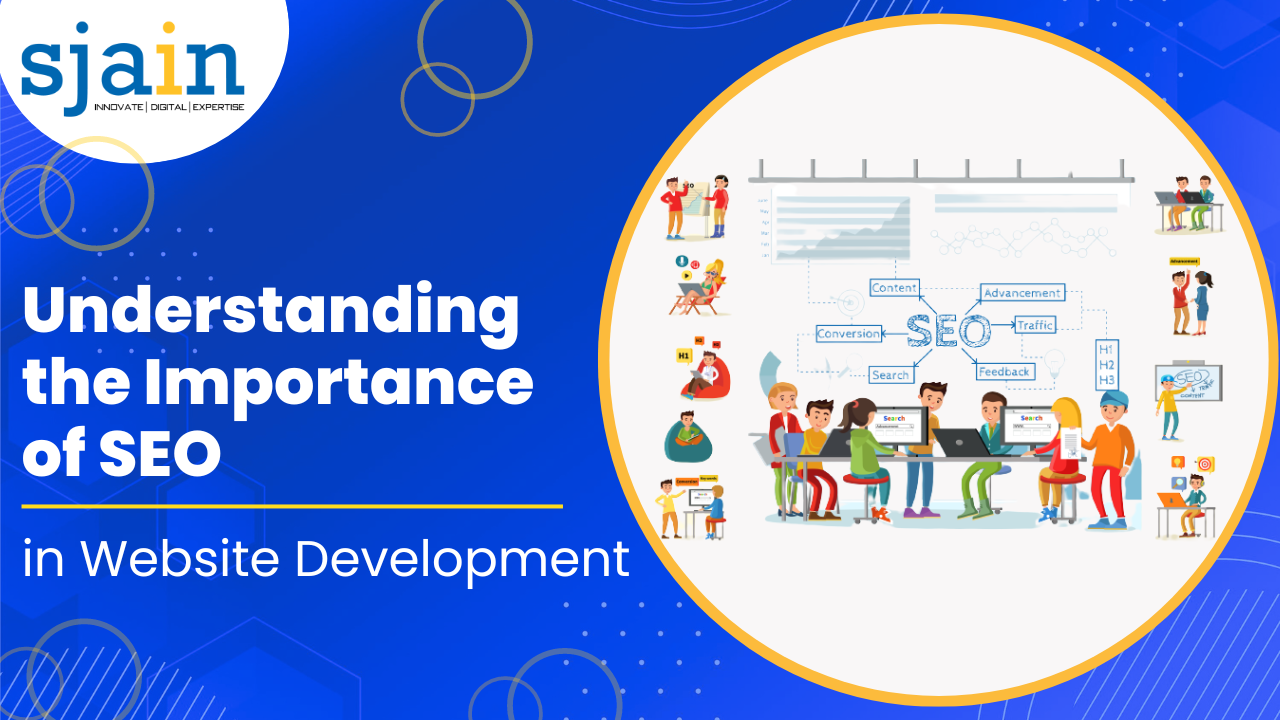Understanding the Importance of SEO in Website Development
A good online presence is critical for organizations in today’s digital age. Websites serve as a virtual storefronts, and it is essential to optimize them to ensure maximum visibility and reach. Search Engine Optimisation (SEO) is a critical component of website creation. In this essay, we will look at the significance of SEO and how it affects website creation.
What is SEO in Website Development?
SEO stands for Search Engine Optimization. It is the practice of optimizing a website to improve its visibility and rankings on search engine results pages (SERPs). SEO involves various techniques and strategies to enhance a website’s organic traffic and attract relevant visitors.
The Role of SEO in Website Development
Website development goes beyond designing an aesthetically pleasing interface. It includes optimizing the website’s structure, content, and technical aspects to ensure search engines can understand and index it effectively.
SEO plays a significant role in website development by:
Enhancing visibility
SEO helps websites appear in relevant search results, making it easier for potential customers to discover them.
Driving organic traffic
By optimizing a website for search engines, it can attract organic traffic, resulting in higher conversion rates.
Increasing credibility
High rankings on search engines build trust and credibility among users, increasing the likelihood of engagement and conversions.
Benefits of Incorporating SEO in Website Development
Incorporating SEO in website development offers several benefits, including:
1. Improved User Experience
SEO techniques, such as optimizing page speed, mobile responsiveness, and user-friendly navigation, enhance the overall user experience. A well-designed and user-friendly website leads to longer visitor sessions, reduced bounce rates, and increased engagement.
2. Increased Organic Traffic
By targeting relevant keywords and optimizing content, SEO helps websites rank higher on SERPs. Higher rankings lead to increased organic traffic, as users are more likely to click on websites that appear at the top of search results.
3. Better Conversion Rates
SEO not only attracts traffic but also focuses on targeting the right audience. By optimizing for relevant keywords and providing valuable content, websites can attract visitors who are more likely to convert into customers or take desired actions.
4. Cost-Effective Marketing
Compared to traditional advertising methods, SEO is a cost-effective marketing strategy. Once a website is optimized, it can attract organic traffic without ongoing advertising expenses, making SEO a sustainable long-term investment.
Keyword Research and Analysis
Keyword research and analysis are fundamental aspects of SEO. It involves identifying relevant keywords and phrases that users commonly search for when looking for specific products, services, or information. Effective keyword research allows website owners to create content that aligns with user intent and improves the website’s visibility in search results.
On-Page Optimization
On-page optimization refers to optimizing individual web pages to improve their search engine rankings and attract organic traffic. It involves optimizing meta tags, headings, content, images, and URLs, among other elements. On-page optimization ensures that search engines can crawl and understand the content of a page effectively.
Off-Page Optimization
Off-page optimization involves activities performed outside the website to improve its visibility and reputation. This includes building high-quality backlinks, social media engagement, guest blogging, and online reputation management. Off-page optimization helps establish the website’s authority and credibility in the digital landscape.
Technical SEO
Technical SEO focuses on optimizing the technical aspects of a website to ensure search engines can crawl, index, and understand its content. It includes optimizing website speed, implementing structured data markup, improving site architecture, and fixing technical issues that may hinder search engine visibility.
Mobile Optimization
With the increasing use of mobile devices, mobile optimization has become crucial for website development. Mobile optimization ensures that websites are responsive and user-friendly across various mobile devices. Google and other search engines prioritize mobile-friendly websites in their search results, making it essential to provide a seamless mobile experience.
User Experience and SEO
User experience (UX) and SEO go hand in hand. Websites that prioritize UX tend to perform better in search engine rankings. Factors such as page speed, intuitive navigation, mobile-friendliness, and engaging content contribute to a positive user experience. By focusing on UX, websites can improve their SEO performance and attract more organic traffic.
Content Creation and SEO
Content creation plays a significant role in SEO. High-quality, relevant, and engaging content helps attract organic traffic, build backlinks, and establish the website’s authority. Content should be optimized for relevant keywords and structured in a way that is easily readable by both users and search engines.
SEO Tools and Analytics
Several SEO tools and analytics platforms are available to assist website developers and marketers in optimizing their websites. These tools provide insights into keyword rankings, backlink profiles, website performance, and user behavior. By leveraging SEO tools and analytics, website owners can make data-driven decisions to improve their SEO strategies.
SEO Best Practices
To achieve optimal results with SEO, it is important to follow best practices, including:
Conducting comprehensive keyword research and analysis.
- Optimizing meta tags, headings, and URLs.
- Creating high-quality and valuable content.
- Building high-quality backlinks from reputable sources.
- Ensuring website speed and mobile responsiveness.
- Regularly monitoring and analyzing SEO performance.
- Staying updated with search engine algorithm changes and industry trends.
The Future of SEO
SEO is a dynamic field that continues to evolve with advancements in technology and changes in search engine algorithms. The future of SEO rests in user intent optimization, voice search optimization, neural networks, and machine learning as search engines get smarter and more complex. Website builders and advertisers must keep up with these changes and adjust their strategies accordingly.
Conclusion
In conclusion, incorporating SEO into website development is crucial for achieving online success. It enhances visibility, drives organic traffic, improves the user experience, and increases credibility. By following SEO best practices, conducting keyword research, optimizing content, and staying updated with industry trends, websites can maximize their potential and reach a wider audience.

